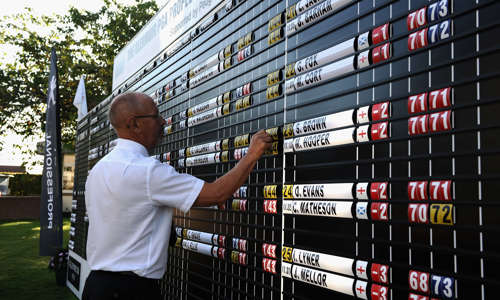COVID-19 Sole Trader scenarios for accessing government support
COVID-19 Sole Trader scenarios for accessing government support
The PGA have created various scenarios to provide guidance on government support for self employed Members.
Background
The Professional Golfers’ Association is aware that self-employed PGA Professionals use a variety of business models in order to deliver their services. Almost every PGA Professional is currently affected by business interruption due to the COVID-19 emergency, while government advice and support is evolving almost daily.
Against this background, the Association is keen to provide some clarity to members on what government support is currently available under a number of scenarios, depending on how their individual businesses are constituted, and how this support might be accessed. This information is for guidance only. It is not intended to be prescriptive and legal and accounting/tax advice should be sought where appropriate.
Types of business model
The key business situations under consideration are:
- Sole trader
- Partnership
- Limited companies
- Multiple income sources e.g. employed for some services, self- employed for others
SOLE TRADER
Definition
A sole trader is a person who is the exclusive owner of an unincorporated business, entitled to keep all profits after tax has been paid, but liable for all losses.
Examples of primary activities
Scenario 1 - Club Professional
Scenario 2 - Coach
Scenario 3 - Tournament player
The scenarios that follow are intended to be samples of situations which might arise, and should be treated as indicative to allow the PGA member to best assess his or her own likely situation in relation to the COVID-19 financial challenges.
Scenario 1a - Club Professional
Joe is a Club Professional who has been trading for many years. He has run a successful business as a sole trader and is VAT registered.
He traded throughout 2019/20, until such times as the golf courses throughout the United Kingdom were closed. Joe’s business is now effectively mothballed until the current crisis plays out and he has put his qualified Assistant, an employee, on furlough under the terms of the Coronavirus Job Retention Scheme to minimise the financial impact and ready himself to restart trading in the next few months. He fully intends to get his business back on track during 2020/21.
Joe has made the following trading profits over the last three financial years, and has submitted his tax returns for all three years:
| Tax year | |
| 2016/17 | £35,000 |
| 2017/18 | £45,000 |
| 2018/19 | £40,000 |
| Total | £120,000 |
| Average trading profit | £40,000 |
His trading profits represent 65% (i.e. more than 50%) of his total income.
Joe is therefore likely to be entitled to grant support under the Self Employed Income Support Scheme (“SEISS”) of up to 80% of his monthly average trading profit or £2,500, whichever is lower. His average monthly income is £3,333 (80% of which is £2,667) so Joe’s grant will be restricted to £2,500 per month for the three months to 31 May 2020.
Joe does not need to contact HMRC at this stage to claim this grant. HMRC is checking eligibility and will invite applications from those eligible once the scheme is operational.
If Joe’s application is ultimately successful, he will receive a lump sum grant payment directly into his bank account from early June 2020. This grant will form part of his taxable income for tax year 2020/21, and will need to be declared in his self-assessment tax return which is due to be submitted to HMRC by 31 January 2022.
Joe was due to pay the next instalment of his 2019/20 self-assessment income tax on 31 July 2020. He does not now have to pay this until 31 January 2021, although he is free to make the payment in July 2020 if he so wishes.
Joe may want to liaise with his accountant with a view to completing his financial statements and filing his 2019/20 self-assessment tax return early in order to crystallise any refunds etc which might fall due to him.
Joe’s turnover exceeds £85,000 per year, so he has been registered for VAT for some time. His VAT quarter ended on 31 March 2020, and his VAT return was therefore due for submission to HMRC, and his payment due to have cleared, by 7 May 2020 (one month and 7 days after the end of the VAT quarter). However VAT payments due between 20 March until 30 June have been deferred and now fall to be paid by no later than 5 April 2021, so this should have a positive impact on Joe’s cash flow, until such times as his SEISS grant is received in early June. However, Joe still needs to submit his VAT return by 7 May 2020 to avoid penalties.
If Joe pays his VAT by direct debit, the payment will be taken from his account when his VAT return is lodged with HMRC, so he should consider cancelling his direct debit and reinstating it in time to meet the new due date for payment.
Update May 4 2020 – Joe’s accountant contacted him on 28 April to let him know of a new Coronavirus Bounce Back Loan Scheme which had been announced by Government the previous day. This new loan scheme is aimed at helping small and medium sized businesses, particularly with cash flow, during the current pandemic and no fees or interest apply for the first 12 months of each loan.
As a sole trader whose business is based in the UK, was not in financial distress on 31 December 2019 and which has been negatively affected by the pandemic, Joe seems to meet the criteria for a loan and intends to complete the on-line application form on the British Business Bank website when the system opens on 4 May 2020.
The loans are underwritten by the Government and are worth between £2,000 and £50,000, or 25% of turnover.
The funding could be particularly useful in the short term since the loan attracts 0% interest in the first 12 months, and there are no penalty clauses for early repayment, so it may suit Joe as a short term kick-start to get his business active again.
In summary, at this time Joe can take advantage of the UK government’s SEISS grant funding, maximise cash flow advantages by deferring self-assessment income tax and VAT payments and maintain his workforce by using the furlough arrangements. From 4 May 2020, he may also be able to take advantage of the Bounce Back Loan Scheme, subject to his application being approved.
Scenario 1b - Club Professional
Justin is a recently qualified PGA Professional who was appointed to his first club professional’s position in November 2018.
Prior to taking up his position, he was the qualified assistant at another golf club, where he was paid a salary and supplemented his earnings by undertaking junior coaching. Justin has the accounts from his business as a sole trader made up to 31 March each year.
He submitted his tax return for 2018/19 by the due date of 31 January 2020, reporting both the earnings from his employed status and a small surplus from the first 5 months of his self-employed work as a new club professional and coach.
For 2018/19, Justin’s income can be summarised as follows:
| Income from employment | £15,000 |
| Trading profit | £6,000 |
| Total income | £21,000 |
He continued to operate in his position as club professional throughout 2019/20 until such times as the golf courses throughout the United Kingdom were closed, and fully intends to continue in his role when the lockdown is over.
He had hoped to take advantage of the Self Employed Income Support Scheme (“SEISS”) to tide him over for the next few months. However, while he meets many of the criteria for the grant, his trading profits in 2018/19 were less than 50% of his total taxable income, so he is unlikely to qualify for the grant support otherwise available through SEISS.
Justin was due to pay the next instalment of his 2019/20 self-assessment income tax on 31 July 2020. He does not now have to pay this until 31 January 2021, although he is free to make the payment in July 2020 if he so wishes.
He may, in the meantime, want to liaise with his accountant with a view to completing his financial statements and filing his 2019/20 self-assessment tax return early in order to crystallise any refunds etc which might fall due to him.
Update May 4 2020 – Justin became aware of the Bounce Back Loan Scheme which had been announced by Government on 27 April and felt that this might be of use to him to assist with cash flow during the pandemic. He plans to complete the on-line application form when the system opens on 4 May 2020.
Justin’s business has now been established for 18 months and In the 9 months since the end of his last financial year, all of Justin’s income has been from trading operations. At 31 December 2019 it was not a business in difficulty, so he is likely to be eligible for a loan of between £2,000 and 25% of his turnover.
The funding could be particularly useful in the short term since the loan attracts 0% interest in the first 12 months, and there are no penalty clauses for early repayment, so it may suit Justin as a short term kick-start to get his business active again.
In summary, Justin unfortunately cannot take advantage of the SEISS scheme but, In the absence of any other income at present, he may want to consider making a claim for Universal Credit. He may also be eligible for a Bounce Back Loan which would assist in his cash flow at the current time and which he understands can only be used to provide economic benefit to the business and not for personal use.
Scenario 2 - Coach
Fiona is a well-respected coach working out of a number of venues. She’s a sole trader, made a trading profit of £24,000 in 2018/19 and continued to work full on during 2019/20 at an increased capacity due to the industry-wide demand for female coaches.
Her coaching business is her sole source of income, but her diary currently has no forward bookings because of the COVID-19 uncertainty. She intends to continue coaching throughout the rest of this year, once the restrictions on movement are lifted.
Fiona did some overseas trips with groups of women golfers during January and February 2020, and because she was out of the country, missed the deadline of 31 January for filing her 2018/19 self-assessment tax return. She intended to get round to it during March, but with the speed of the lockdown, didn’t quite manage to do so.
Now her income stream has dried up and she would like to apply for the Self Employed Income Support Scheme ((“SEISS”) which would allow her to receive a grant of up to 80% of her computed trading income or £2,500 (whichever is lower) per month for the three months from March to May. However, because she has not submitted the 2018/19 tax return and paid her income tax instalment due by 31 January 2020, Fiona does not currently qualify for the SEISS grant.
Fiona now has a short window up until 23 April 2020 to submit her 2018/19 tax return and pay her outstanding tax and penalties, and, if necessary, she should contact her own accountant to progress this as a matter of urgency.
Once her tax return has been submitted and her payments are up to date, Fiona is likely to be able to apply for the SEISS, as her average trading profits will be able to be computed and used as the basis for any grant application.
She does not need to contact HMRC at this stage to claim this grant. HMRC is checking eligibility and will invite applications from those eligible once the scheme is operational.
If Fiona’s application is ultimately successful, she will receive a lump sum grant payment directly into her bank account from early June 2020. This grant will form part of her taxable income for tax year 2020/21, and will need to be declared in her self-assessment tax return which is due to be submitted to HMRC by 31 January 2022.
Fiona was due to pay the next instalment of her 2019/20 self-assessment income tax on 31 July 2020, but will not now have to pay this until 31 January 2021, although she is free to make the payment in July 2020 if she so wishes.
She may, in the meantime, want to ask her accountant to prepare her financial statements and file her 2019/20 self-assessment tax return early in order to crystallise any refunds etc which might fall due to her.
In summary, if Fiona manages to submit her 2018/19 tax return and make the relevant associated payments to HMRC by 23 April 2020, she should be in a position to make an application for SEISS grant funding, and take advantage of the deferral of the income tax payment due in July 2020.
Scenario 3 - Tournament player
Sam is a player of some repute, earning most of his income from playing at County, Regional and National level, supplemented by delivering some coaching and certain elements of sponsorship, including accompanying a group of businessmen on international pro-am trips.
100% of his income is generated through his business as a PGA Professional.
He makes up his accounts to the end of December each year to coincide with the end of the PGA’s annual tournament schedule, and has submitted all of his tax returns on time.
Sam has had a successful few years on the golf course, and has reported the following trading profits over the last three financial years:
| Tax year | |
| 2016/17 | £45,000 |
| 2017/18 | £51,000 |
| 2018/19 | £43,000 |
| Total | £139,000 |
| Average trading profit | £46,333 |
Since his average trading profit is under £50,000, he is likely to be entitled to grant support under the Self Employed Income Support Scheme (“SEISS”) of up to 80% of his monthly average trading profit or £2,500, whichever is lower. His average monthly trading profit is £3,860 (80% of which is £3,088) so Sam’s grant will be restricted to £2,500 per month for the three months to 31 May 2020.
Sam does not need to contact HMRC at this stage to claim this grant. HMRC is checking eligibility and will invite applications from those eligible once the scheme is operational.
If Sam’s application is ultimately successful, he will receive a lump sum grant payment directly into his bank account from early June 2020. This grant will form part of his taxable income for tax year 2020/21, and will need to be declared in his self-assessment tax return which is due to be submitted to HMRC by 31 January 2022.
Since Sam does not have premises such as a retail outlet or professional’s shop to maintain, and his business is very much dependent on his own success as a player with regular prize fund winnings and his personal reputation as a coach, he has limited commitments during this lockdown period and will be able to get his business active again as soon as lockdown is lifted. He has nowhere to practice in order to hone his game for the restart of the season, and although he considered the need for a Bounce Back Loan when it was announced on 27 April, he decided not to apply on the basis that his normal outgoings are not significant, he has some savings built up from his many successful years playing tournament golf and he would prefer not to have loan finance hanging over him.
Sam was due to pay the next instalment of his 2019/20 self-assessment income tax on 31 July 2020. He does not now have to pay this until 31 January 2021, although he is free to make the payment in July 2020 if he so wishes.
He may want to liaise with his accountant with a view to completing his financial statements and filing his 2019/20 self-assessment tax return early in order to crystallise any refunds etc which might fall due to him.
In summary, Sam should be in a position to make an application for SEISS grant funding, and take advantage of the deferral of the income tax payment due in July 2020.



































